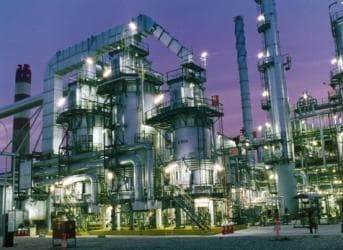Already the largest oil exporter in the world, state-owned Saudi Aramco plans to significantly expand refining capacity and for the first time ever to venture into oil trading, which could render it the world’s largest integrated energy company; but mounting security threats pose a serious challenge to these ambitious goals.
Aramco Trading, which opened in January, plans to move 1.5 million barrels per day in physical oil and gas, paper, futures and derivatives trading. The move coincides with Aramco’s goal of doubling its refining capacity to 8 million barrels per day in ten years in a $200 billion investment.
Since January, Aramco Trading has built up its capacity to handle over 500,000 bpd in refined products, condensate and sulphur, according to Reuters, which cited Saudi oil officials as saying that trading in crude oil is not part of the mandate, for now.
But as Aramco expands, a number of very fluid threats pose a grave security challenge, and there is a history of intense differences in security strategy between Aramco, which operates fairly autonomously despite its state-owned status, and the state security organs.
With Saudi Arabia producing nearly 10 million bpd of oil and given its status as the only country with the ability to stabilize world oil prices through excess production, protecting Saudi Arabia’s oil infrastructure is critical to world markets.
The greatest threats to Saudi oil infrastructure emanate from groups linked to al-Qaeda in the Arabian Peninsula (AQAP) and unrest in Yemen that threatens to destabilize Saudi Arabia’s Eastern Province, which is dominated by the country’s Shi’ite minority and which sympathizes with the Houthi rebels just across the border in Yemen’s north. Further afield, there are mounting concerns that Yemen’s Houthi rebels could engage Iran for support in opening a Red Sea route for weapons – a scenario that could provoke a dangerous naval showdown between Saudi Arabia and Iran.
According to Michael Bagley, CEO of Jellyfish Operations, a Washington, DC-based private intelligence firm with ongoing operations in the Middle East and a strong focus on energy security, Saudi Arabia’s oil infrastructure “is particularly vulnerable due to the fact that the country’s oil production and refining depend on a limited number of hubs”.
Two-thirds of Saudi Arabian oil is processed at the Abqaiq facility, and there are two main export terminals: Ras Tanura and Ras al Ju'aymah. Saudi Arabia is home to around 80 oil and gas fields, but the bulk of reserves are located in only eight fields.
In an interview with Oilprice.com, Bagley said “this concentration makes it more vulnerable to attack.”
He also pointed out that piracy on the high seas, which is increasing in reach and sophistication, will continue to pose a great risk to export routes.
What is less often acknowledged, says Bagley, is that Saudi Aramco’s production and refining capacity is also vulnerable in the case of an attack on any one of the country’s three electricity-generating plants. “This would wreak an equal amount of havoc on oil operations as an attack on oil fields and production facilities,” Bagley told Oilprice.com.
The recent history of attempted attacks on Saudi oil infrastructure highlights the challenges of strategic security coordination. In particular, an attempted attack in February 2006 on the Abqaiq oil processing facility - arguably the world’s most critical oil hub through which flows some 70 percent of Saudi Arabia’s exports - exposed the differences between Aramco’s own security initiatives and state security. Al-Qaeda militants attempted to blow up the facility but were thwarted at the last minute.
Aramco and the Saudi Interior Ministry traded accusations over the incident, and leaked diplomatic cables revealed that the Interior Ministry had attempted to convince the Americans to exclude Aramco from the infrastructure security decision-making process. The Interior Ministry went as far as to suggest that some Aramco employees were affiliated with extremist groups – an accusation that Aramco vehemently denied.
Aramco accused the Interior Ministry of careless security efforts and took security into its own hands, signing a deal with America’s Northrup Grumman for a $1 billion perimeter surveillance system.
In 2008, Saudi security forces arrested more than 700 suspected al-Qaeda militants believed to be plotting attacks on oil installations. Preceding this, a number of attacks specifically directed at the oil infrastructure were under taken by militants believed to be related to al-Qaeda. In November 2003, militants attacked a compound in Riyadh, killing 17 people. In May the following year, militants attacked a petrochemical site in Yanbu, killing five foreigners, and a compound in Khobar, killing 22 people and taking hostages.
Where Yemen is concerned, Saudi Arabia is struggling to maintain a modicum of stability in the country, partially by dumping enough free oil into Yemen to help the country meet its immediate energy needs.
According to Bagley, while the Kingdom is tackling broader security problems coming from Yemen and its own Eastern Province, Aramco is more than capable of determining its own strategy for securing its oil installations, though solid cooperation and information-sharing between the state security organs and Aramco will be necessary for success. “This is a highly sophisticated company, with a highly innovative outlook and a realistic perspective on its security needs. It will do everything in its power to raise the bar on oil infrastructure security.”
Attacks on Saudi oil infrastructure, even if thwarted, have a significant impact on the world market. News of the attempted attack on the Abqaiq facilitiy in 2006 caused oil prices to jump by more than $2 a barrel.
“Terrorists present a new kind of threat in terms of their willingness to suddenly change strategies and tactics to attack energy facilities. This threat not only presents a threat to the physical security of key oil facilities, but it also adds to the “security premium” in the global oil market,” the Center for Strategic and International Studies (CSIS) noted in the aftermath of the 2006 attempt.
By. Charles Kennedy for Oilprice.com


















